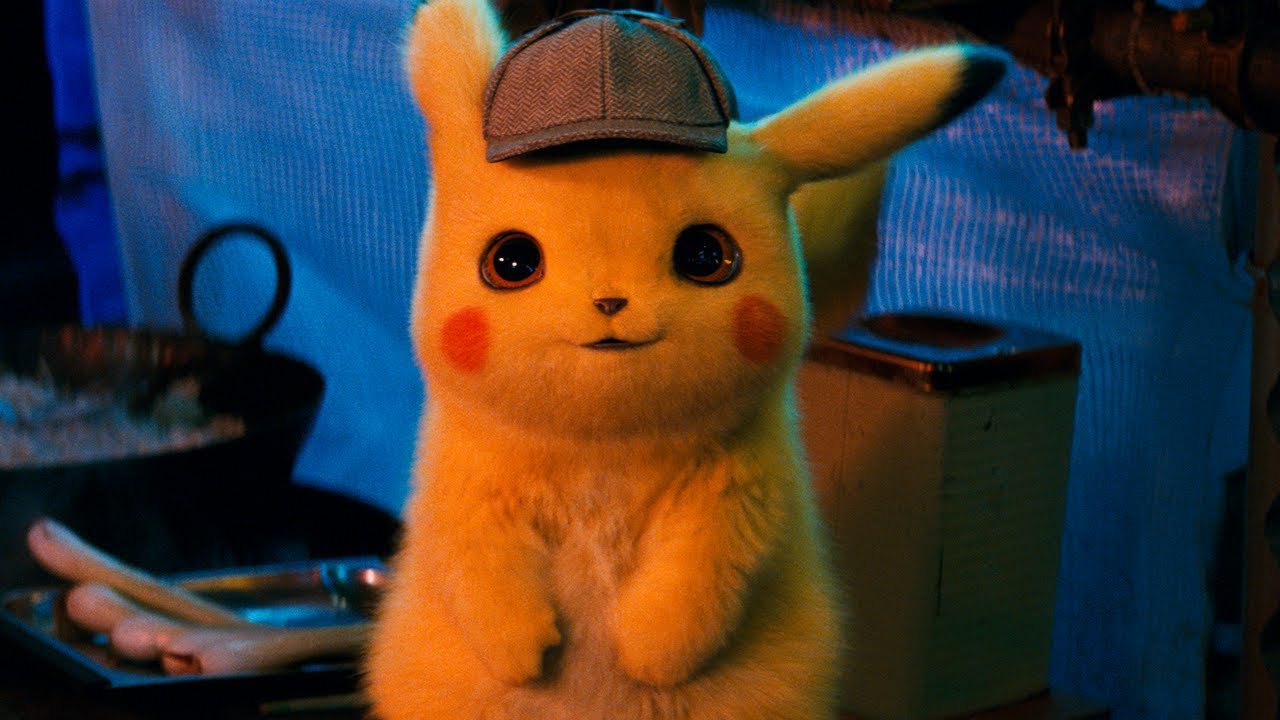This review contains spoilers.
Look, I don’t know much about Pokémon other than people catch these wild creatures, trap them in electric balls of some kind, and then, when they wish to fight another Pokémon, they unleash their captive critter on the other captive critter and encourage them to battle til one of them is defeated. The opening of Rob Letterman’s film, Pokémon Detective Pikachu, has Justice Smith’s comfortable loner Tim Goodman attempt to catch a Cubone (a Pokémon that wears the skull of its dead mother as a helmet, joy), only for the Cubone to run in fear, and then, when caught by the Pokeball, he lashes out in rage at being contained. While Tim’s friend, Jack (Karan Soni), reminds him that Pokémon need to want to be caught, there’s something purely terrifying about the fear in the creatures eyes about being contained.
Going into Pokémon Detective Pikachu, I wasn’t expecting a particularly deep exploration of, well, anything. After all, this is a film based off a spin-off of one of the largest video game creations of all time. And, if we’re going off the video games alone, and not engaging with the wealth of other films and television entertainment out there, then it’s also a video game series that has not particularly strayed far from the ‘catch every single digital beast out there and conquer every other monster you can find’. That opening of trying to catch a Pokémon really sets the tone of how unsettling the ‘capture’ process is for the Pokémon themselves.
This is reinforced by the existence of Ryme City – a metropolis created by genius Howard Clifford (Bill Nighy, perfectly cast as one of the few actors who can easily swap between endearing and menacing, making his villainous third act character turn quite entertaining) where Pokémon and humans can live comfortably together. The trademark Poké battles have now been pushed underground, with a reliance on peace and harmony with the Pokémon of the world rather than a thirst for continuous violence. This ultra-progressive concept – of a world of creatures living in unity with humans – is the first realisation that this is a wonderfully left leaning, green power focused film. (For the many questions about ‘what do Pokémon and humans eat’, is it not hard to see that with the real world lab grown faux-meat out there, that in a world of Pokémon there might be something similar?)
But, this world of harmony is at threat, with the existence of a purple gas that’s making its way through the streets of Ryme City, causing Pokémon who inhale it to lose all control and cause all kinds of mania. It’s clear that this gas is designed to cause an imbalance within the relationship of Pokémon and humans. While the initial notion that maybe this gas is designed to bring back the world of Poké battles and restore humanity as the dominant force over Pokémon, rather than a uniting one, there’s something a lot more nefarious and terrifying at its core.
As a Pokémon novice, I’m aware that one of the basic elements of the Pokémon world is that Pokémon can ‘evolve’ at a certain point, becoming larger, more powerful versions of themselves. There’s an inherent video game logic to this that isn’t entirely explained in the film other than if you kick a Magikarp, it’ll evolve into a water dragon thing. But, for villain Howard Clifford, who due to degenerative disease, finds himself in a wheelchair, he sees the ‘evolution’ of Pokémon as a prime opportunity to help ‘evolve’ humankind. While it would be great to not have another film that employs the disabled villain trope, it’s what we’re presented with here in Pokémon Detective Pikachu.
For Howard Clifford, the discovery of the ‘most powerful Pokémon ever’ – Mewtwo – means that the opportunity to utilise the power of Pokémon for the perceived good (or benefit) of mankind is undeniable. After all, humans have been using animals for the benefit of mankind throughout generations, with everything from the milking of horseshoe crabs for their blood, to the endless exploration into the efficacy of xenotransplantation (the use of human genes to trick organs of animals into working inside a human body). Animals have continually been at the centre of many medical discoveries, with continued animal testing thriving around the world. So, when Howard Clifford discovers a way to transfer the consciousness of humans into the body of Pokémon – creatures who, up until this point in the film, have been shown to be fully autonomous creatures who contribute to society in their own ways (we clearly see Pokémon with jobs) -, he does so with the pure intention of ripping that autonomy away and once again putting the obnoxious, self-serving demands of humanity ahead of the world at large.
It’s worthwhile noting a genuinely hilarious throwaway joke that the Ryan Reynolds voiced Pikachu says as he and Tim Goodman are thrown around by the moving ground of a giant Pokémon beast that carries the earth on its back: ‘at this point, how could you not believe in climate change?’ After all, the creatures that are causing the massive earthquake like experience they’re going through are quite clearly man made Pokémon. And while Ryme City is a positive, man made creation, it’s clear that not all man made creations are positive, with climate change being the most obvious one.
Look, Pokémon Detective Pikachu isn’t a particularly deep film, it certainly isn’t going to change the world with its mostly ineffectual detective plot (of which I’ve decided there’s little point touching on), but for a film of its size and calibre to treat the autonomy of the creatures that exist in the world with mankind as their own entities, and that have rights and privileges, is something that needs to be applauded. The ease of making a film about controlling creatures and battling them against each other is right there, but Rob Letterman and his three other credited co-writers opted for the more intriguing path – the more ethical, left leaning one.
And given the wealth of films where eco-conscious villains (I struggle to use the word ‘eco-terrorists’, even though that is, technically, what they are) are employed as the major threat – looking at you Kingsman and Godzilla: King of the Monsters -, it’s refreshing to see a film embrace the notion that maybe, just maybe, there could be a world where animals and humans could live together in harmony.
Director: Rob Letterman
Cast: Justice Smith, Ryan Reynolds, Bill Nighy
Writers: Rob Letterman, Dan Hernandez, Benji Samit, Derek Connolly




